Checkmate Culture
Chess' cultural reset: reinvented as the ultimate power move, where hype collides with strategy and every move matters.
In 1912, a mechanical marvel named El Ajedrecista (Spanish for “The Chess Player”) challenged the boundaries of human ingenuity. Following in the footsteps of the 18th-century Mechanical Turk, the infamous chess automaton that captivated European royalty before its human puppeteer was exposed, El Ajedrecista was different: it wasn’t a hoax. Guided by a primitive algorithm, it could outsmart opponents with moves preordained by its creators. Over a century later, algorithms remain at the heart of our cultural choreography, dictating trends, communities, and even desires. But while El Ajedrecista played on a board of 64 squares, today’s algorithms play on the vast, digital plains of our lives.
And yet, in this hyper-curated age, chess itself—one of the original algorithmic metaphors—has staged a comeback. The board has been flipped, and chess is now the ultimate power move for a generation looking for meaning in strategy, community, and aesthetic finesse. Just like El Ajedrecista and the Mechanical Turk once signalled the future, the game of kings is re-entering the zeitgeist, proving that in a world obsessed with reinvention, the oldest strategies are often the most enduring.
Chess For Flex
The 2020s have comfortably adopted the buzzwords defining their cultural vibe: If-You-Know-You-Know, curation culture, niche taste, economy of taste, micro-communities, connoisseur mindset, gatekeeping culture, archivist mindset, cultural currency, and so on. All these terms converge to praise a culture of the few over a culture of the masses. No need to dissect yet again the mechanisms that have propelled culture from mainstreamed hype to a siloed bubble, where pride emanates from being in-the-know.
“This shift from product 'hype' to a more discreet 'IYKYK' value signals a growing desire for individuality – as if products were discovered by consumers themselves rather than being hyped up and fed to them.” — Marian Park, 2024
47% of Gen Z report belonging to a niche fandom that no one they know personally is a part of. — Youtube Culture & Trends, 2024
“New types of mini communities and cultural guides (dare we say subcultures) are emerging from the vacuum [...] These communities allow for experimentation and encourage actual engagement, a more satisfying participatory experience in, and creation of, culture, than the backseat ride the algorithm has us on.” — Day One Agency, 2023
Beyond an underlying need for distinction and individuality—though even this IYKYK culture is now a collective norm—the shift surely signals dissatisfaction with mainstream culture. This pride-fuelled nichification has created a cycle of hacking hobbies into the next cultural flex. Running and hiking? Already hacked—massively. Fishing? Currently in the process, as evidenced by Burberry’s 2024 meditative campaign and fishing micro-influencers like @pecheurgamin, vlogging from Marseille on TikTok.
So, what’s next? Once gatekept by geekish cohorts, board games—and chess in particular—are perfectly positioned to deliver all the cultural flex points niche culture demands. Chess, with its steep learning curve and strategic mystique, is the ultimate connoisseur’s game. Grandmaster and World No. 1 Magnus Carlsen anticipated the hype, co-founding Take Take Take, a chess-viewing platform designed to make the game more accessible. With expert commentary and live-streamed matches on YouTube, the platform has already captured Gen Z’s attention.

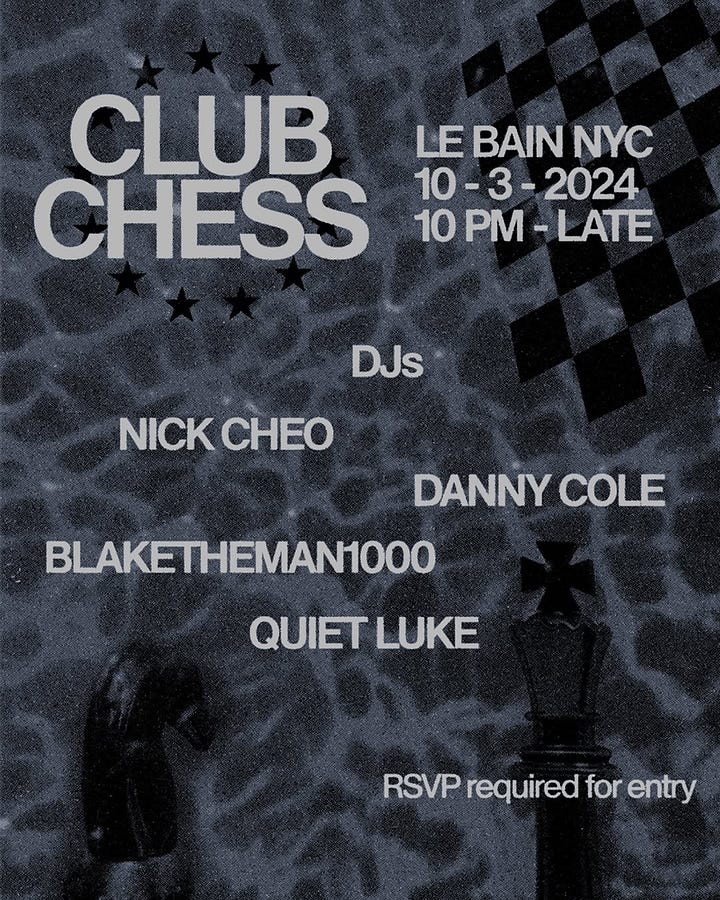
Cool kids are embracing chess’ rise, ensuring its reinvention as a cultural symbol. Gambit Chess Club in Paris, CsCb in London, and Club Chess in the USA are flipping traditional chess clubs into hubs of hype and cultural capital. Paris’ Union de la Jeunesse Internationale—founded by Maison Château Rouge’s Youssouf Fofana—has announced a chess tour with Gambit Chess Club and Daily Paper. Meanwhile, Club Chess merges strategy with party culture, blending chess with aesthetic experimentation.
Even retail and luxury brands are tapping into chess’ visual cues. Portland’s experiential retail store, CHESS CLUB, frames the spirit of chess as “a playground for visual culture,” while RIMOWA has elevated gameplay with its Chess, Mahjong, and Poker Attachés. Business of Fashion warned in 2021 that “fashion is missing the Netflix revolution,” failing to leverage chess’ potential following The Queen’s Gambit. But chess’s cultural revenge is here—and it’s thriving.
Strategy & Social Currency
The 2020s are also home to the Dead Internet Theory, which has evolved from a fringe conspiracy to a widely debated concept amplified by the internet itself. The theory posits that human interaction online is vanishing as bots increasingly dominate digital spaces.
“Dead Internet Theory is in some ways linked to the rise of casual or ‘passive content’ consumption, which has become increasingly prevalent with the rise of AI bots online.”
“Passive engagement with content – often algorithmically curated – has led to a landscape where much of the content consumed is not actively sought but passively absorbed. In the context of Dead Internet Theory, this trend is especially noticeable as more of the online content we interact with is not created by people but generated by AI bots, designed to fill our attention spans with easily consumable, automated material.”
— Rupert Russell, concept-driven filmmaker and author, for Protein
With this theory comes another: internet refugees. When TikTok faced a temporary US ban, ‘TikTok refugees’ migrated to RedNote. Similarly, emerging internet refugees are apparently abandoning online spaces for offline groups. According to the New York Times, Gen Z and millennials are flocking to chess, mahjong, and backgammon clubs in search of real-world connection. In the US, the rummikubers community prioritises bringing people together rather than turning the game into a cultural flex.
“Once upon a time people were born into communities and had to find their individuality. Today, people are born individuals and have to find their communities.” — Youth Mode: a report on Freedom by K-HOLE, 2014
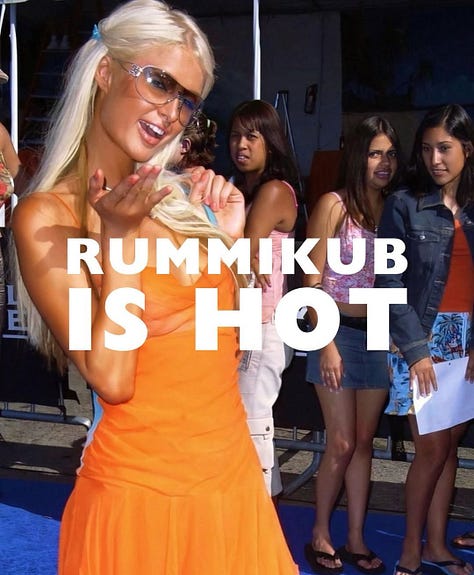


The chess phenomenon transcends its newfound hype, offering an antidote to the loneliness epidemic plaguing digitally absorbed youth. In Pakistan, singer and activist Shehzad Roy has made a chess curriculum freely available through the Zindagi Trust, his non-profit organisation, encouraging children to swap screen time for critical thinking and strategic planning skills.
Elsewhere, chess is reclaiming nightlife spaces. The LA Chess Club has emerged as an alternative to traditional nightlife, attracting singles with its late-night events. Free entry for women ensures inclusivity in a male-dominated arena, offering a reprieve from online dating fatigue. Just like running clubs that have turned into dating occasions—with the notable, underlying fact that running clubs’ female members are starting to complain that they are intentionally turned into “potential dating targets”, when they “just wanted to find a crew to run with.”
Game of Survival
As we step into 2025, the chaos of recent years still lingers. “How are you feeling about 2025?” Reddit users ask, as bad news about wars, retrograde governments, and economic instability floods the landscape. Yet, global optimism persists.
65% of global respondents admit that 2024 was “a bad year for my country”. Moving forward, 71% say they are optimistic 2025 will be better than 2024. — Ipsos Predictions Survey 2025
“Turning 25 is a big deal, for individuals and a new century [...] This year feels like a pivotal moment, one where I aim to embrace transformation by stepping outside my comfort zone and evolving into the best version of myself. It’s a year filled with opportunity, where I plan to seize every chance to learn, grow and achieve milestones I’ve been working toward.” — Bloomberg Businessweek, 2025
Whether or not this new optimism can be attributed to January’s fresh energy, as we finally get used to the permacrisis, individuals are slowly quitting the ruling escapist counter-mechanisms and embracing more grounded strategies. The comeback of traditional role models and life paths already signalled this preference towards realism, and the anti-trend uniform dressing replacing escapist microtrends confirms the cultural shift towards facing reality head-on. Chess, with its prepare-for-the-next-move ethos, epitomises this zeitgeist.
“Alekhine saw much less far in life than he did on the chessboard. In this space and time that living beings agree to call ‘reality,’ he neither foresaw the future nor controlled his destiny.” — La diagonale Alekhine by Arthur Larrue, 2021
To survive in this world we finally agree on dealing with, playing chess is preparing us to strategize our moves—just like chess’ ancestor, chaturanga, helped young princes to learn military strategy. In this vein, BBC’s Chess Master delivers not just entertainment but lessons in psychology, strategy, and resilience. Governments are taking note, too. The UK’s £500,000 chess fund is already boosting its presence in schools, preparing future generations for strategic thinking.
Fashion and art are similarly inspired. Presented in Dubai last year, the Duality Chess by Argentine multimedia artist and graphic designer Pilar Zeta acts as a demonstration of the multi-faceted human existence: “kings, symbolizing portals, act as conduits bridging realms of light and darkness; queens represent the mind; bishops embody emotions; knights epitomize vitality; and castles depict the physical body. Meanwhile, the pawns, depicted as eggs, evoke contemplation on creation’s dynamic force within the duality of the game.” One entire chess game to represent the complexity of our times.
Furthermore, the ‘Marathon of Life’ collection by Spanish label POMPEII (a brand already recognized as the living legacy of Aime Leon Dore’s sartorial creativity) positions chess aesthetics as the embodiment of wisdom and growth harnessed in an immediacy-obsessed world: “[...] with patience comes the clarity of long-term goals, because, although cliche, Rome wasn't built in a day, good things take time, effort and sacrifice. Legacy isn't given but earned [...] The Marathon of Life is an ode to long journeys and life missions, with its ups and downs, but with the fulfillment of having put all your effort and focus on achieving your goals in the best way you, not somebody else, seems fit.” In the same vein, Daily Paper’s ‘Chess Forum’ Holiday collection launched in October 2024 celebrates the chess-inspired motto: “make your new move, your best move.” Chess isn’t just a game anymore—it’s a manifesto for navigating life’s complexities.
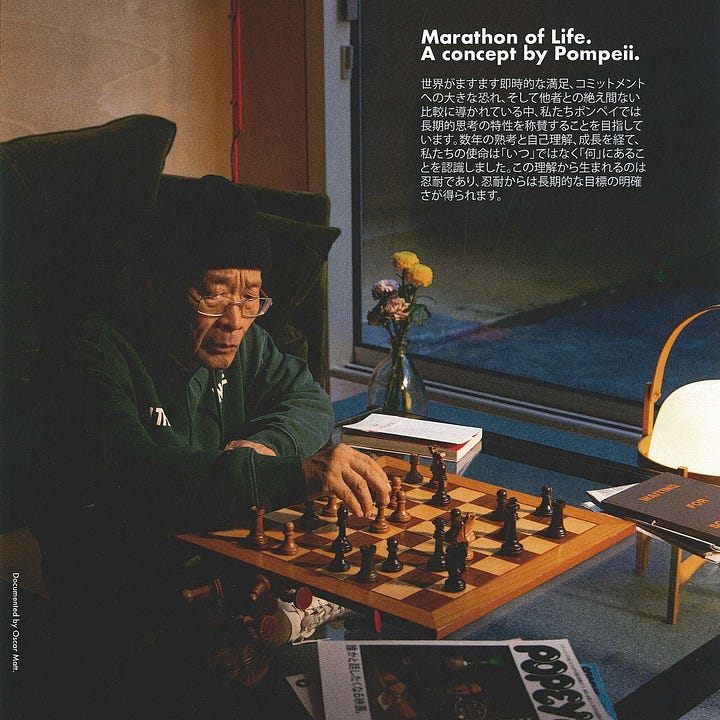
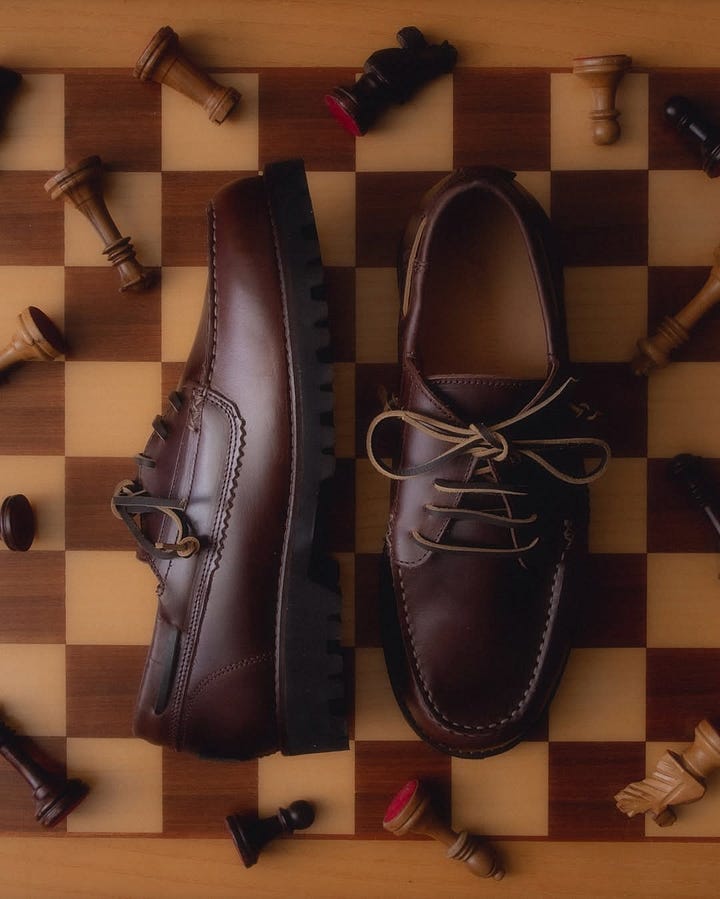
What we’re witnessing is a cultural recalibration, a reinvestment in chess’ symbolic power to navigate a precarious balance between chaos and calculation. This isn’t a sudden re-emergence but a reawakening—a reappraisal of its relevance in an age defined by complexity, disconnection, and the need for foresight. Amid fractured attention spans and algorithmic overload, chess reasserts itself with a steady hand. It’s no relic; it’s a mirror, reflecting the necessity of strategy, patience, and deliberate moves in a culture obsessed with immediacy.
More than a game, chess has become a canvas for cultural expression and a manifesto for resilience. Its timelessness defies passing trends, offering clarity and purpose in a landscape hungry for both. At a time when the next move often feels uncertain, the game reminds us of a simple truth: progress isn’t about playing to win—it’s about mastering the art of thinking several steps ahead. In that deliberate approach, we might just rediscover the clarity this moment demands.







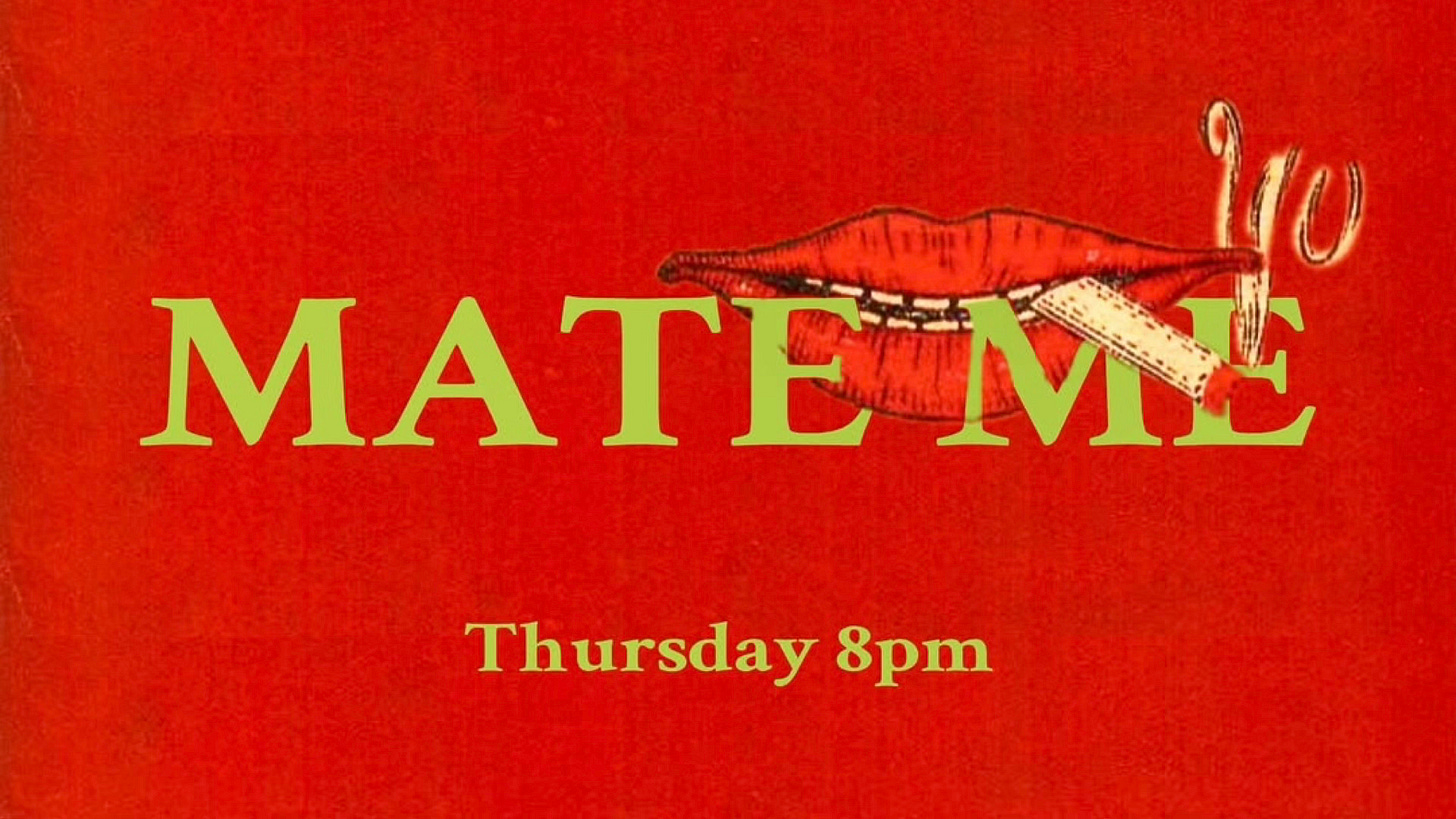
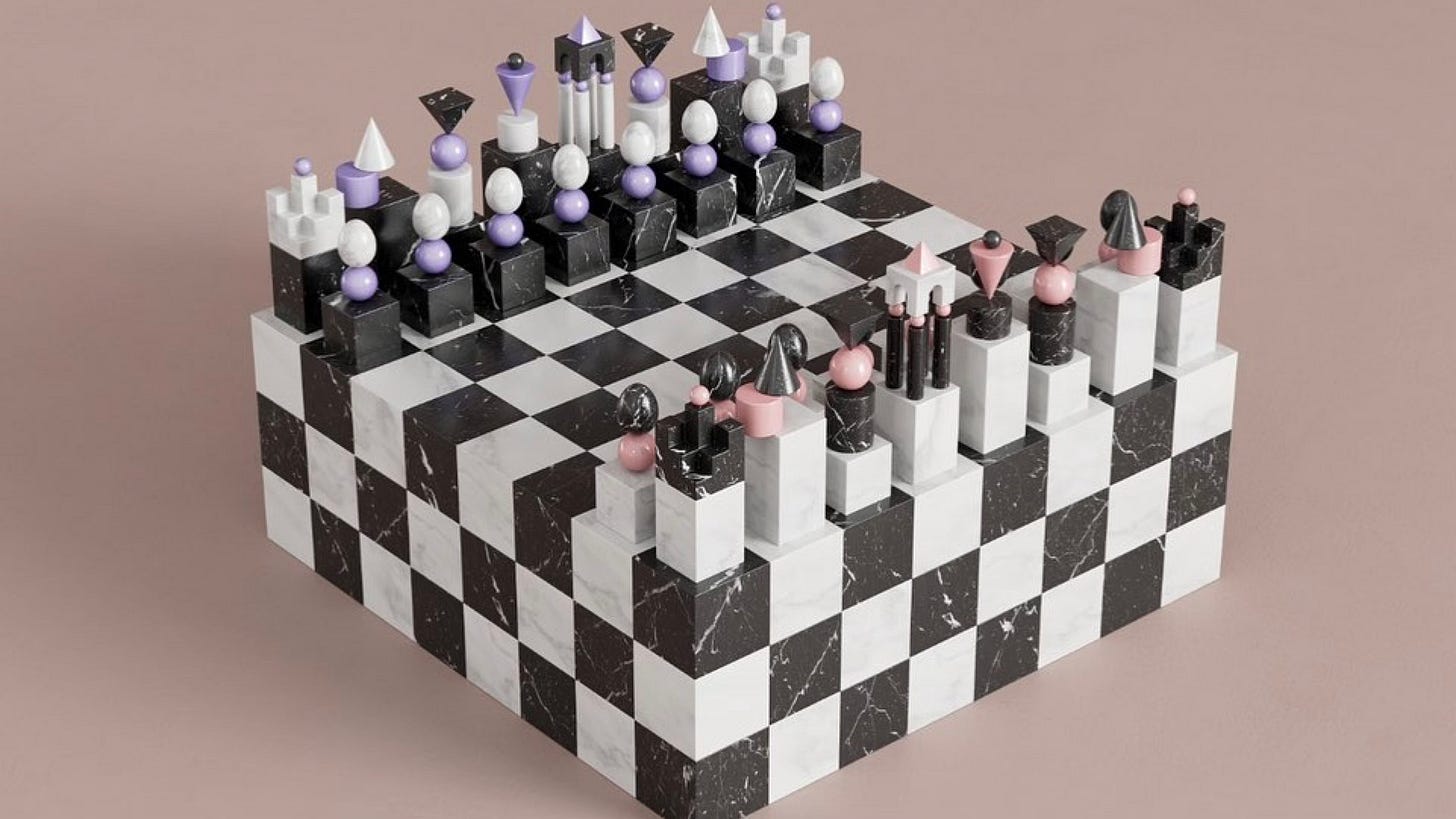
Can we also give a shout out to Knight Club in London (https://www.instagram.com/kn1ghtclub.chess), making chess cool for Gen Z and also more inclusive.